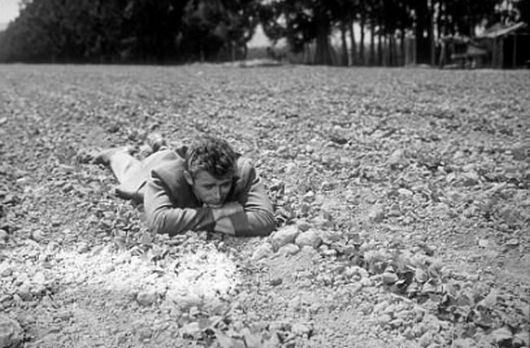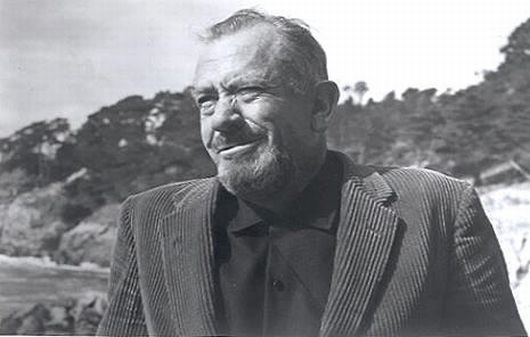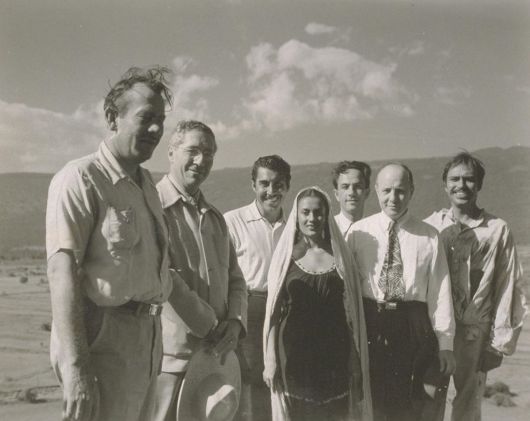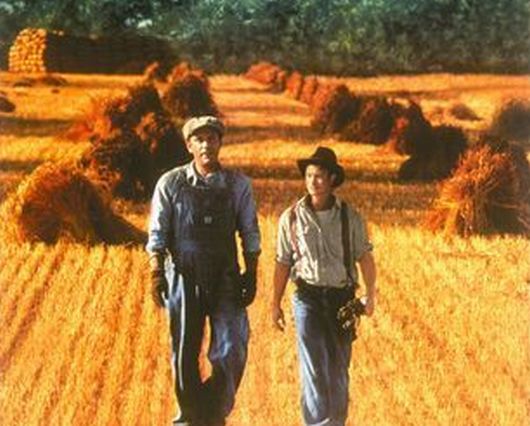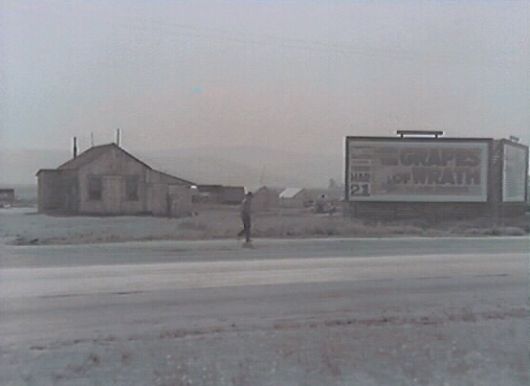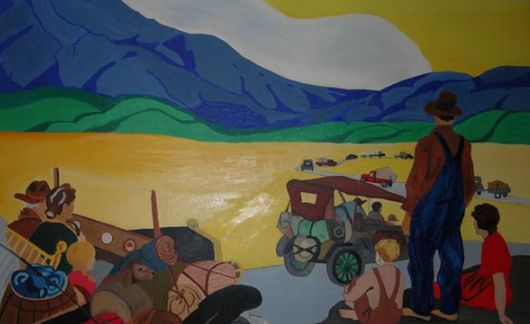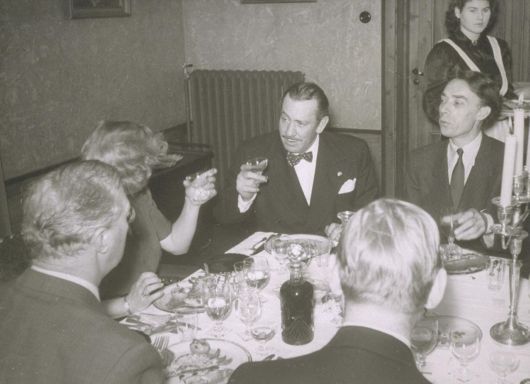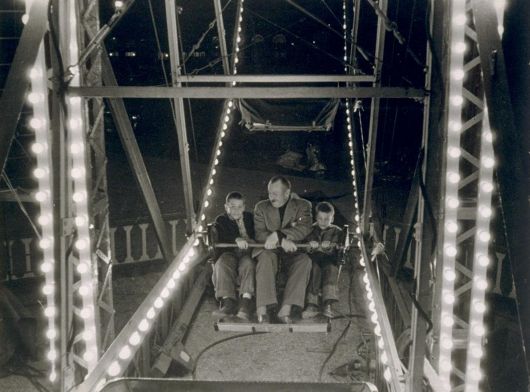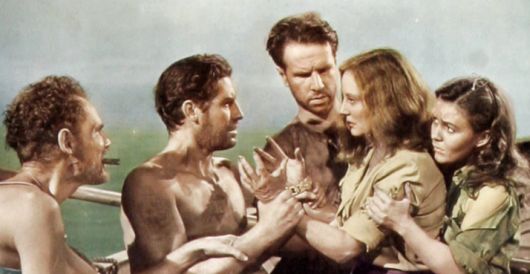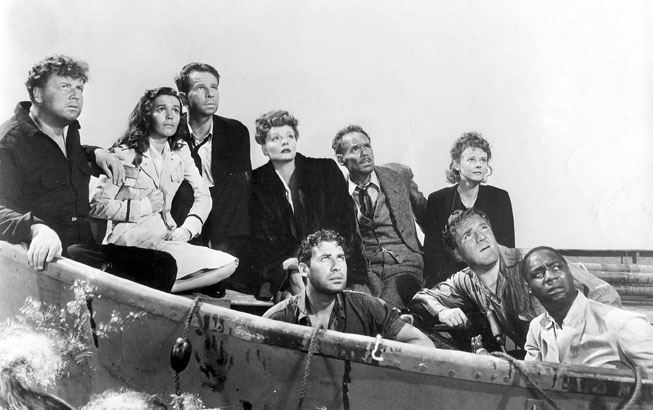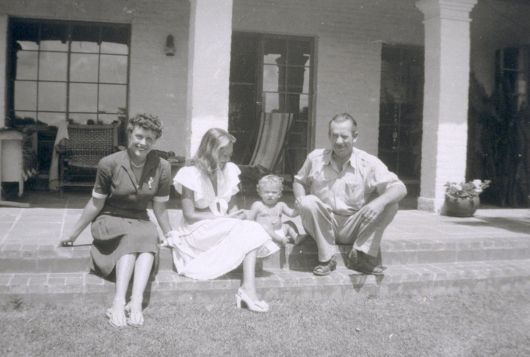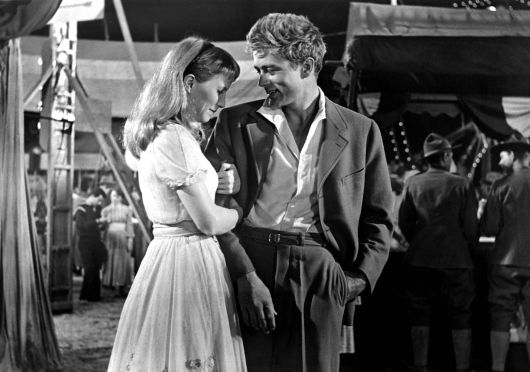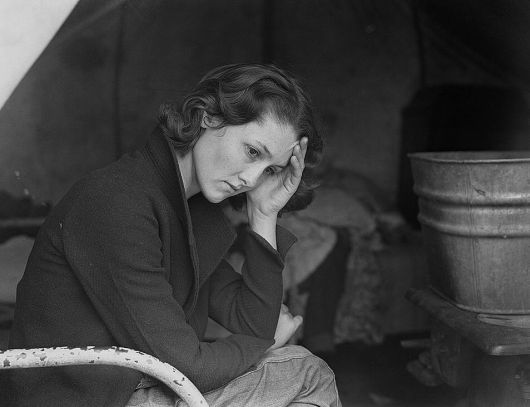 BOOKS
BOOKS In Which When Pilot Fish Fasten On Shark They Contribute Only Drag
 Thursday, January 6, 2011 at 11:48AM
Thursday, January 6, 2011 at 11:48AM You can find the first part of this series here.

The Fireplace Still Burns
After his divorce from Gwyn, John Steinbeck settled into a bit of a rut. He questioned almost everything about the way he lived his life, and fell into something of a writer's block. In his personal affairs he was clearly a lonely man who was not exactly a pleasure to be around, and his prolific letter-writing took over as his major connection with others. The explosion of energy we find in these letters to his editor Pascal "Pat" Covici, constitutes the journal he felt he had to keep while working through the pain of losing his family.
 with his two kids, john and thom
with his two kids, john and thom
To Pascal Covici
September 1948
Dear Pat —
The thing makes a full circle with 20 years inside of it. Amazing, isn't it? And what wonderful years and sad ending ones. I am back in the little house. It hasn't changed and I wonder how much I have. For two days I have been cutting the lower limbs off the pine trees to let some light into the garden so that I can raise some flowers. Lots of red geraniums and fuchsias. The fireplace still burns. I will be painting the house for a long time I guess. And all of it seems good.
There are moments of panic but those are natural I suppose. And then sometimes it seems to me that nothing whatever has happened. As though it was the time even before Carol. Tonight the damp fog is down and you can feel it on your face. I can hear the bell buoy off the point. The only proof of course will be whether I can work — whether there is any life in me. I think there is but that doesn't mean anything until it gets rolling. Women I will have to have of course, only I wonder if I have learned to keep them in their place. They have a way of sprawling all over and that I can't have any more. I haven't enough time and I couldn't take another sequence like the last two.
Anyway this is just a note to tell you I'm in a new shell or an old one, like a hermit crab and the ink is now out of two of my pens and this is the last one. I have no more ink in the house tonight. I'll keep you posted.
Affectionately
(and write to me)
John

To Pascal Covici
September 19, 1948
Dear Pat:
You are right — I do get the horrors every now and then. Comes on like a cold wind. There it is, just a matter of weathering it. Alcohol doesn't help that a bit. I usually go into the garden and work hard.
At that moment Ritch and Tal Lovejoy came in for a cup of coffee and then I watered the garden and here it is dusk. A very quiet Sunday and I've enjoyed it. My hands are literally tired from moving rocks. And it is a fine feeling.
It has been one of the dark days that I like very well — overcast and almost cold except that flowers like it and seem to be on fire in such a light. I think flowers' colors are brighter here than any place on earth and I don't know whether it is the light that makes them seem so or whether they really are.
I debated strongly about whether to dress and go out to dinner or whether to cook something and stay home in quiet and determined on the latter.
So I'll close and send you more reports.

October 18
Dear Pat:
I got to reading Auden's introduction to the Greek portable and it is very fine. He is such a good writer. Have you read Lady Godiva and Master Tom by Raoul Faure? A really blistering study of a woman.

I shall be going to Los Angeles with Kazan about the first of November and to Mexico soon after. Probably be gone for about a month. I have not worked on The Salinas Valley. I don't want to now until everything is clear because I think I am about ready for it and I'm letting it stew. It would be bad if the whole conception turned out no good. But I'll do it anyway. I am really looking forward to the doing of it, good or bad.
I miss Ed and I don't all at the same time. It is a thing that is closed — that might possibly have been closing anyway. Who can tell? Great changes everywhere and every which way. I still get the panic aloneness but I can work that out by thinking of what it is. And it is simply the breaking of a habit which was painful in itself but we hold onto habits even when we don't like them. A very senseless species. There is no future in us I'm afraid. I can hear the music beginning to turn in my head. And by the time the spring comes I hope I will be turning with it like a slow and sluggish dervish or some mushroom Simon Stylites, a fungus on a stone pillar.

Friday
Dear Pat:
The week I've put in planting — things I'll probably never see flower - either because I won't be here or I won't be looking. I have no sense of permanence. This is way stopping-place, I think, as every other place is. I've made my tries at "places" and they don't work. But this is a good way stopping-place and a good one to come back to — often.
I awakened the other night with a great sense of change happening somewhere. Could not sleep anymore and all night the sense of change, neither pleasant nor unpleasant but happening. It hung on for several days. Gradually my energy is coming back a little at a time. It is so strange that I could lose it so completely. One never knows what he will do ever.
Just now the rain started, very gentle and good. I hope it rains a long time. There has not been enough.
I'm sorry I was so closed in, in New York. But I realized more than any time in my whole life that there is nothing anyone can do. It's something that has to be done alone. Even with women, and that's good, there is largely no companionship except for a very little while.
This has been a long bleak day.

Saturday
Curious sleepless night after a long time of oversleeping. There was a great thunder and lightning storm in the night and rain fell. Maybe the changing pressure kept me awake. I know I'm very sensitive to changing pressures.
Beth [his sister] is supposed to come down today. I hope she does. It is a long time since I have seen her. We have a lot to talk over. And she is usually so surrounded that there is no chance to see her alone.
 with bob hope on a USO tour of Southeast Asia in 1966
with bob hope on a USO tour of Southeast Asia in 1966
Monday
This is turning into a diary. Beth did come down and I got to see her alone for the first time in a long time. She is well but of course is working too hard as always.
This time I am going to send this
love,
John

To Pascal Covici
November 1, 1948
Dear Pat:
Well that is over. Thanks for your letters. They helped. I'm leaving for Hollywood tomorrow and for Mexico on Friday. I'm pretty much relaxed, I think, things have been about as disgusting and nasty as they can get and they didn't kill me. I wish I could thoroughly believe that this is to be a new leaf. I wish I could be sure I have learned something. I am not sure of either. But I can try. At least if I try it again there will be a shudder of apprehension.
Gwyn once told me that she could do anything and I would come crawling back. At the time I was very much in love with her but even then I told her not to depend on it. A woman holds dreadful power over a man who is in love with her but she should realize that the quality and force of his love is the index of his potential contempt and hatred. And nearly no women or men realize that. We will not mention this again in a post-mortem sense. Only if it becomes active will it be necessary. I think I am getting strength back — perhaps more than I have had in 17 years and perhaps more than I have ever had. I want the hot words to come out again and hiss on the paper and I think they may. My needs are filled.
I hope you will write to me. I thank you for the fine bale of yellow pads. I shall make good use of them, I hope. And on your next trip out here I will get you drunk on red wine and music and the old ghosts we have neglected will walk again and wail on the wet rocks. This is a time of change and maybe of destruction, but the waves and the tide will not change, no matter how much we blast or are blasted. The black roots of the little species may put own new leaves. It is about time. There has been nothing erected for a long time. Matter is creative, that we have known and studied, but we have forgotten that the grey lobes in the head are creative too — the only and unique creative thing in the whole world of our seeing and hearing and touching.
A lot of high flown language but let it flow. Never again does it have to stoop to critics, or friends or lovers. It can be as good or as silly as it can be, not wise and smart and little.
And that's all for now. I will write to you from Mexico. I'm working on the life of a very great man but primarily a man. It would be good to study him closely. His life had a rare series — beginning, middle and end, and most lives dribble away like piss in the dust.
I'll be talking to you soon.
John

Many of his friends became worried about him. Mildred Lyman, of the McIntosh and Otis office visited him before he left for Mexico and wrote to Annie Laurie Williams:
"He is deeply disturbed and frightened about his work. If it doesn't go well in Mexico I honestly don't know what will happen. The fact that so much time has elapsed without his accomplishing anything to speak of worries him a great deal. He has a defense mechanism which is constantly in action and it is hard to get behind that. What John needs more than anything right now is discipline. I'm afraid that he wanted to get to Mexico for reasons other than writing. I heard quite a bit while I was with him about the gal, and I don't think that bodes any good. She's a tramp. He writes tons and tons of letters late at night. He is in a strange mood and has a very peculiar ideas of women these days. He eats at odd hours and not properly, stays up late and sleeps late and tries so hard to convince himself that he likes it."

By the end of November of that year, he had written to Covici to say, "I did Thanksgiving very well but Xmas I will not try. I will get a gallon of wine and the prettiest girl I can find and I will forget Christmas this year." By the following summer, he was feeling at least a little more energized, writing to the novelist John O'Hara, whose Appointment in Samarra had been a literary sensation.

To John O'Hara
June 8, 1949
Dear John:
Your letter made me very happy. This is a time of most profound readjustments, emotional as well as in other directions and the reassurance of a letter like yours cannot be overestimated. Everything dried up as it is bound to, and got out of drawing and with three more mixed metaphors I will have a literary bouillabaisse, or how do you spell it.
I am extremely anxious to read your new book. There are lots of reasons for this. I believe that your hatreds are distilling off and that your work is all ahead of you. Maybe the training in hatred in all of us is necessary. For hate is a completely self-conscious and personalized emotion and a deterrent to a clear view but it may be as necessary to developing ability as the adjectives we later learn to eliminate. But we must first use the adjectives before we can know how to leave them out.
I've had seven months of quiet out here to try to reduce the maelstrom to tea kettle size. For myself there are two things I cannot do without. Crudely stated they are work and women, and more gently — creative effort in all directions. Effort and love. Everything else I can do without but if those were effectively removed I would take a powder instantly.
Being alone here has allowed me to think out lots of things. There is so much yapping in the world. The coyotes are at us all the time telling us what we are, what we should do and believe. The stinking little parasitic minds that fasten screaming on us like pilot fish that fasten on a shark, they contribute only drag. I think I believe one thing powerfully — that the only creative thing our species has is the individual, lonely mind. Two people can create a child but I know of no other thing created by a group. The group ungoverned by individual thinking is a horrible destructive principle. The great change in the last 2,000 years was the Christian idea that the individual soul was very precious. Unless we can preserve and foster the principle of the preciousness of the individual mind, the world of men will either disintegrate into a screaming chaos or will go into a grey slavery. And that fostering and preservation seem to me our greatest job.
This will probably be a long and boring letter, but I need some one to talk to and good or bad for you, you are tagged.
You see I worked last year but it was all experiment and notes. I've been practicing for a book for 35 years and this is it. I don't see how it can be popular because I am inventing method and form and tone and context. And of course I am scared of it. It's cold lonely profession and this is the coldest and loneliest because this is all I can do, and when it is done I've either done or I never had it to do.
 Ernest Hemingway, Sherman Billingsley and John O'Hara
Ernest Hemingway, Sherman Billingsley and John O'Hara
I've reread your letter and this is another day. You know I was born without any sense of competition. Consequently I have never even wondered about the comparative standing of writes. I don't understand that. Writing to me is a deeply personal, even a secret function and when the product is turned loose it is cut off from me and I have no sense of its being mine. It is like a woman trying to remember what child birth is like. She never can.
Again I have re-read your letter. And you are quite right. A man is always married. I wonder though whether he can be married to idea — with different people carrying the ball (oh Jesus!). I will know sometime maybe. Being married to me is a very hard thing. I am kind and loving and generous but there is always the rival (work) and to most women that is worse than another woman. They can kill or eliminate another woman but that rival they cannot even get close to no matter how you try to make them a part of it. And there's the necessity for being alone — that must be dreadful to a wife.
This maundering will probably go on for some time.
Now it is even more days later. I thought, after I stopped writing the other day, regarding your words about a wife. And do you remember in the Mabinogion, the ancient Welsh story of a man who made a wife entirely of flowers?
My boys will be with me in another two weeks and I will be glad. I deeply resent their growing and me not there to see. that is the only thing I resent now. The rest is all gone. But imagine if you couldn't see your daughter for months at a time when every day is a change and growth and fascination. I saw my oldest boy turn over on his back and discover the sky and in his look of wonderment I remembered when it happened to me and exactly how it was.
That's all now. But I would like and need to keep in touch.
John
You can read the first part of this series here.
 meeting lyndon johnson with his son in 1963
meeting lyndon johnson with his son in 1963
"Convict Lake" - John Vanderslice (mp3)
"White Wilderness" - John Vanderslice (mp3)
"The Piano Lesson" - John Vanderslice (mp3)
 with third wife Elaine Scott
with third wife Elaine Scott
If You Feel Something, Might As Well Write It Down And Mail It To Someone

The astonishing letter writing of Vladimir Nabokov...

The deep waters of Ernest Hemingway...
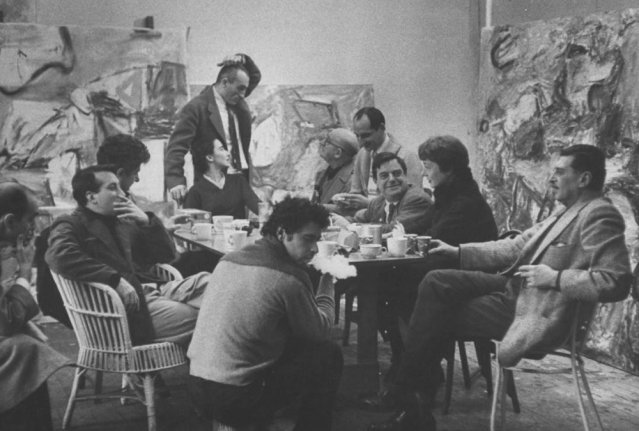
Elaine de Kooning's memories of Mark Rothko...

Gustave Flaubert and George Sand's squabbles...

Gertrude Stein knows more about these things than most...

Let's face it, Anne Sexton was one hell of a woman...

James Agee's magical Plans for Work...

The last letter of John Cowper Powys to Henry Miller...

The autobiography of Robert Creeley...

The cagey love affair of William Faulkner...

Lillian Hellman and Dashiell Hammett lie for fun and profit...

Elizabeth Gumport and Dawn Powell...

John Ashbery explains Fairfield Porter through his letters...

Jessica Ferri on Sylvia Plath...

Georgia O'Keeffe's journal and letter writing has no equal...

The stormy relationship of Rimbaud and Verlaine...
 john o'hara,
john o'hara,  john steinbeck
john steinbeck 































